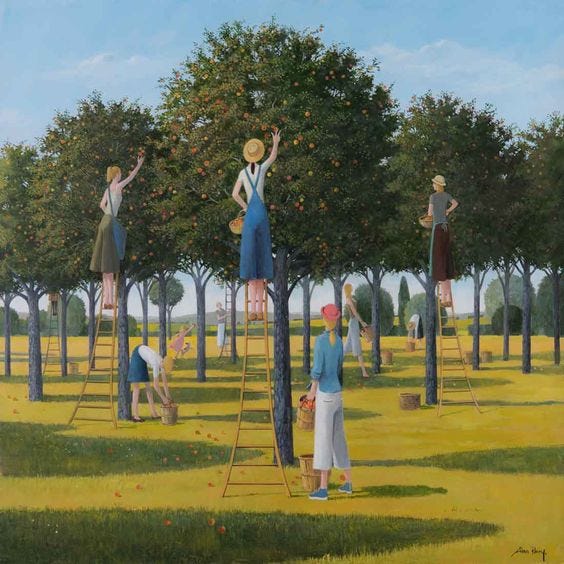Welcome back to Wonderland.
This digital series is my personal treatise on philosophy and modern political theory. I take you through my ideas from first-principles, through the analogy of a fairy tale.
If you want to know how this story starts, please start from the beginning of the series.
But I’ll catch you up on where we left off: You have come to the marvellous Town of UM and travelled to the palace to meet the Princess, wishing to know who could rule a place that is so prosperous. She used a magical lamp to show you wondrous visions, and in a fit of compulsion you snatched it away, leading to your quick capture by the palace guards.
This installment of Wonderland is concerned with justice, crime, and punishment. Given the modern world we live in, with all of its information and technology, how should an ideal judicial system function? What aspects of the current cultural norms are effective, and which are maladaptive patterns we have simply grown accustomed to? So often the structural foundations of our society are accepted implicitly, without any consideration as to how we got here or what alternatives may be preferable. This is what we will be examining today.
But first, let’s pick up from where we left off in Wonderland…
Wonderland is a free publication that outlines a philosophy and political vision for the 21st century. To support my work and receive updates on new posts, sign up for a free or paid subscription.
Chapter One: A Crime Against the Crown
You wake up in a white room without windows. You sit up and see a toilet, sink, and door with no handle. The door swings open and a man with a bushy moustache walks in. It’s Tru! The guard from the gate. He is carrying a clipboard and gives you a disappointed look up and down.
“Well, if it isn’t our new hero,” says the guard with a frown. “Look kid, I thought you said you were here with good reason and now I find out you’re on trial for treason?”
“Treason?!” You gasp. “But I only took the lamp! And I didn’t mean to, either. It was like something compelled me to, like I had to be here.”
“A theft of the highest order are what officials are calling it. If the wrong people got a hold of the Mudjinnshin’s lamp this would all go to shit!” He says, gesturing around the room emphatically. “Look, just between us two, who sent you? The Sorcerers of Sect? Or the Thieves of Thumb? They all have it in for the great Town of UM.”
“I wasn’t sent by anyone!” You insist. “What I told you at the gate is true, Tru. I’m just a traveller, trying to get through. I’m sorry about the lamp, I swear I’m not a thief or a tramp. I know something’s wrong with me, but what it is I haven’t any clue. I just keep finding myself doing things I know I didn’t choose.”
“Why, that’s certainly bad news,” Tru’s hand scribbles something down on the clipboard. “Do you have anyone else who can attest to your story? I fear the punishment for high treason can get rather gory.”
You consider this for a moment and then say, “I was with Aunt Hillary when I first lost my way.”
“Aunt Hillary, you say?” Tru raises a brow. “I’ll see what I can do, and until then, ciao!”
Before you can say anything more he bolts out the door, and you are left wondering what else is in store.
The first ingredient of any judicial system is the question of what constitutes crime. What are the actions that violate the rules of the social contract and necessitate state intervention? An advantage of the patchwork model described in “The Structure of Freedom” is that it allows for a multiplicity of political systems to coexist harmoniously, each operating by its own principles and serving distinct communities. One person may want to live in a social system with strict rules and harsh consequences, while another prefers a more laissez-faire approach. There is no innate conflict between these groups, conflicts only arise when they are forced to compete for control over the same scrap of territory.
The patchwork model is comparable to the state system, with each patch having total sovereignty over its citizens. So long as people can move freely between patches and choose which legal systems they would like to subscribe to, competition between patches will cause them to refine over time and better serve their customers. This is how the Amish conduct their congregations, and how Native Americans ran their tribes. Anyone who is unhappy with the leadership of a given community is free to leave at any time. A chief is simply someone whom others are willing to follow.
This concept of having multiple rulesets to choose from would operate inwardly as well as outwardly, creating a nested structure. Within a city or patch there could be additional layers of regulation that citizens choose to subject themselves to. For instance, a religious community may create a special zone where all the food sold in the area must abide by certain standards. Or a middle-class suburban neighbourhood may insist upon specific standards of lawn care and designated quiet hours after 9pm. Maybe one area of town will prohibit advertising of any sort and impose strict aesthetic regulations that require building to abide by distinct design codes, creating an alternative atmosphere to the bustle of modern life. As long as citizens are aware of which rules apply to which areas, they can move freely between them and enjoy the benefits of all without having to sacrifice the existence of others.
As to how the legal system itself should function, there are many possible answers. This chapter will present the solutions I believe to be best an offer an explanation as to why. If you find yourself disagreeing with my suggestions, I encourage you to offer alternatives that better align with your ideals or solve problems you believe I have overlooked. It is this process of interrogating our assumptions of how law best brings about order that I care most about. The specific details of how that could or should be implemented are secondary and not reached without productive disagreement and conversation.
First and foremost, I believe that the legal system should be provided for free to all citizens. It is the state’s responsibility to protect you from harm, and if someone violates that right, it should be their responsibility to rectify the situation to the best of their ability (and bear any associated costs). If someone commits a crime against you, you should not have to pay for legal representation in order to receive justice, that is the duty of the government you have entrusted to protect you.
Secondly, all law should be made publicly available, easily accessible, and intelligible. The legal code should be written in simple, straightforward language that any child could understand. To become a citizen, one must demonstrate that they are aware of the associated rights and responsibilities they are agreeing to. Thus, the concept of a “social contract” becomes a living document rather than simply a philosophical ideal. Every year when citizens pay their taxes, this would act as a continual renewal of the agreement, affirming their willingness to abide by the rules of society.
Finally, as the government acts as a formalized protection service, it should guarantee a certain degree of insurance to its citizens. If you are harmed through a crime that has been committed, the state should be held responsible for covering the cost of the damages. Things like the medical expenses incurred by a victim of assault, or the costs associated with repairing vandalized property would therefore become a duty of the state. Of course, this would grow incredibly expensive if the government is not doing its job properly, which is all the more reason why insisting upon compensation would produce more effective protection services and subsequently safer societies. Without having to shoulder the cost of criminal activity, the government has little incentive to meaningfully reduce it.
To aide the state in apprehending criminals, surveillance systems could be used to help solve crimes and dissuade potential criminal activity. Satellite video footage can track crimes as they unfold, while facial identification software and fingerprint records would help to locate suspects and identify them more easily. Of course, some people are concerned about privacy and would not like to live in a place that has the ability to track their movement or has access to databases of personal information. This is the benefit of the patchwork model; they don’t have to participate if they don’t want to. However, over time I believe the benefits of stronger surveillance systems would prove to far overweigh any potential costs.
Now comes the question as to what should actually constitute a crime, to which I adopt essentially libertarian foundations. If there is no active harm occurring towards another person or piece of property, then I think people should be able to do as they please. This means that the vast majority of criminalized behaviour which clogs up out current legal systems would no longer be a punishable offence. People should be able to use drugs, pay for sex, and publicly consume alcohol as they please. Meanwhile, things like DUIs, parking, and speeding tickets will soon become things of the past as autonomous vehicles become the norm.
As I see it, there are three main areas where the state should be expected to intervene on behalf of its citizens: protecting individual autonomy (ones basic rights and liberties), interpersonal relationships (such as trade, contracts, and family law), and environmental integrity (which ensures that public land and private property is not damaged needlessly). There are also actions that do not negatively impact any individual, but instead violate the social compact that was made with the state. There could be reasonable restrictions imposed upon things like possessing dangerous materials such as weapons of war or hazardous chemicals. If it’s discovered that a collection of citizens are conspiring to overthrow the government or commit acts of terrorism, these actions would be prosecuted as crimes against the state rather than harms affecting a specific individual.
For this reason, I have split the domains of crime into two distinct camps: crimes against the community, and crimes against the state. Crimes against the community are all of the usual interpersonal conflicts you would expect to arise in a society. They occur on a local scale, between individuals, and have little consequence outside of the directly impacted parties. Things like theft, vandalism, assault, and involuntary manslaughter would fall into this category. Crimes against the state, on the other hand, are an affront to the institution of government itself. Many people may be involved or impacted, such as large scale environmental damage, terrorist plots, or corporate violations of regulation which harm entire populations. Actions like these are premeditated and must be treated more harshly than your everyday interpersonal injustices.
The legal code should be easily accessible and taught to all citizens from a young age. The public should have common knowledge of what actions constitute a crime and what sorts of consequences occur if you commit them. Most of us have a rough idea of what we should or shouldn’t do, but no specific knowledge on how often or how harshly these standards are enforced. Can I get in trouble for jaywalking? For swiping a pack of gum from the store? For torrenting a movie? Unlike our current legal system, I believe that ignorance of the law is a valid excuse for bad behaviour. It should be the state’s responsibility to ensure that its citizens are aware of the laws they must comply with. No one would expect you to play a game properly if you hadn’t been taught the rules first, so why should political life be treated any differently?
When more people are aware of what constitutes criminal action and why, they become more likely to internally enforce these standards. If the laws are fair and violators are effectively detected and dealt with, citizens have more reason to obey the rules and encourage others to do the same. Right now, the fact that some trivial actions are criminalized makes the entire legal system feel arbitrary and archaic. The state is less likely to be taken seriously or treated with respect when it is evident that the laws are not consistently or unilaterally enforced. Only genuinely harmful action should be made illegal, and the law should be strict about enforcing its standards.
Chapter Two: The Trial
A while later a new guard comes to your cell and tells you to follow his lead. He brings you through a series of long passages and eventually into a large chamber. The space feels like a cathedral; white stone walls tower up towards the ceiling and ornate panes of stained glass decorating the back wall cast colourful beams of light across the room. In front of the windows is a large table in the shape of a thin crescent moon. The Princess sits at its centre, with six empty seats curving inwards on either side.
As you walk down the aisle towards her you pass by benches filled with people. They must be villagers, you muse, come to watch the spectacle. Given the opulence of the room and guard by your side you almost feel like a bride on her wedding day, except for the fact that you’re terrified. You don’t know the first thing about this city. Sure, the people seem nice enough, but now that you’re on trial for treason who knows what they’ll do.
You reach the platform where the table sits, raised above the audience, and the guard motions for you to go ahead. Leaving him behind, you climb the couple of steps towards the Princess and walk forward until you’re standing in the middle of the crescent moon table. The Princess looks at you and then proceeds to rise, raising her arms on both sides. From doors to the left and right of the table enter six men and six women. Each is adorned in elegant, emerald green robes and looks completely at ease. The file in along each end of the platform, taking position behind their respective seats until all twelve surround you. Once they are all in place the Princess speaks:
“These are my Justices, my judges, my jury. They are some of the wisest men and women in all of UM, having been selected by myself and my citizens for their keen minds and fair hearts. You, traveler, are on trial for high treason, for a theft of the highest order, for attempting to steal the lamp of the Great Mudjinnshin. If this power was to fall into the wrong hands, great evil would fall upon all who live across these lands. It is for this reason that we have taken you prisoner. We demand to know who you are and what it is you are doing here.”
She and the other twelve Justices take their seats while another man in green robes rises from the bench behind you and proclaims, “Her Royal Highness, Princes Muza of UM, The Fair and Graceful, has accused you (he points a finger in your direction) of theft and treason of the highest order. If you refuse to answer her questions honestly you will be condemned as an Enemy of the Crown.”
You look around the room full of strangers and see no sign of Tru or Aunt Hillary. “Wait!” You cry. “Aren’t I supposed to have some king of lawyer? A defence attorney? Someone to help me make my case?”
“Nonsense,” says the man. “All we want is the truth. Now, tell us, what was your intention with the lamp? The Princess herself saw you take it. You don’t deny the testimony of her Royal Highness, do you?!”
“No! No, of course it’s true. But look, I didn’t want to take it! It was like some strange force compelled me, like I couldn’t resist.”
“Who are you?” Asks one of the Justices seated at the table. She has mousy brown hair and pointed features which examine you quizzically.
“I… I don’t know. I can’t remember anything about who I am, how long I’ve been here, or where I came from. I’m just as confused as you all are! I’m sorry if I’ve caused any trouble, I swear it wasn’t my intention. Sometimes I feel like a puppet being pulled around on strings.”
“Strings…” Repeats the Princess quietly.
“What’s the first thing you remember?” Another justice asks, a broad man with dark skin and warm eyes.
“A maze,” you say. “All I know is that I started in a giant hedge maze.”
A collective gasp ripples across the audience behind you as the Justices exchange looks of fear, doubt, and awe.
“What’s so strange about that?” You ask, unnerved.
An older Justice with grey hair and spectacles perched upon her nose responds. “Our world is surrounded by a great wall on all sides, no man or magic can cross it. Anyone who tries finds themselves lost in a maze with no end.”
“I was there!” You say. “That’s how this entire adventure started.”
“And how did you escape?” Asks another Justice, he has a stern brow and strong chin.
“By following the right path,” you reply, eyeing the Princess for a look of approval.
She matches your gaze but does not acknowledge it, too intently focused upon the story unfolding before her. “Tru tells me you have a witness,” she says.
“Yes,” you answer, turning your attention towards the Justices. “Aunt Hillary is the first person I met upon coming here, and it was with her when I first lost my way. We were drinking tea in her cabin when suddenly I was overwhelmed with a need to escape. A will that was not my own drove me out of her home and deep into the woods where I later regained consciousness.”
“Is this true?” Inquires the Princess.
“Yes,” says a voice from behind you, and you turn to see Aunt Hillary standing in the aisle.
“Yes,” she says again. “I sensed something was amiss so I sent my ants to investigate the forest and lo and behold this traveler came crawling out of their midst. I’m sorry Princess Muza, I wouldn’t have let them out of my sight had I known that they would come to cause you trouble here. After a spot of tea they wandered in a daze off into the woods without a word. I thought it was rather queer.”
The courtroom murmurs in light of this new revelation and the Princess recalls their attention with a simple clap of her hands. “Thank you, Aunt Hillary, for your testimony. Do my Justices have any further questions they would like to ask?”
A young man with bright eyes and blonde hair rises from the far left of the table. “If what you’re telling us is true, then what would you have us do with you? You say that you don’t know who you are or where you came from, and you’ve proven that you’re prone to act impulsively, without good reason. How can a person such as you be trusted in a place like this? None of us know what you could be capable of next!”
The thought of further fugues brings tears to your eyes. “Look! I’m sorry!” You cry. “I’ll do anything you ask, please! I don’t want to die.”
“Die?” Asks the Princess, raising a brow. “Don’t be silly, we’re not executioners. But you are our responsibility. And my court is correct, you might pose a threat. If there’s nothing else you have to share then we’ll commence our deliberations and take it from there.”
She rises and raises both arms once again, indicating that the proceeding has ended. The Justices follow her lead and file out on either side, leaving you standing in the centre of the crescent table, looking out at an audience of strangers.
Chapter Three: Adversity and Reconciliation
In the chapter of Wonderland titled “Protection and Police”, I describe a system of government services based on the concept of Community Centres. These centres would be situated within 20 minute walks of one another and act as access points where citizens can receive whatever social services they require. Whether it’s a safe place to sleep, food to eat, medical assistance, psychological support, or simply a space to spend an afternoon, the Community Centre would have it all. The surrounding area would consist of gardens, parks, and playgrounds to encourage locals to use these places as central gathering points.
Instead of having police officers who operate out of imposing police stations, the Community Centre would be the home to Guardians; specialized citizens employed by the state to uphold law and order by protecting and serving their community. These Guardians would be rigorously trained in combat, first aid, and interpersonal mediation in order to produce an individual who is able to intervene in almost any situation. It is the Guardians who would be summoned to address crime and resolve conflicts that emerge within the community.
If the perpetrator of an act is unknown, detectives may be called upon to aid in the investigation. They would have the authority to close-off crime scenes, collect evidence, and conduct interviews, but only with consent from the concerned parties. Forcible detainment of a citizen over petty crimes would be impermissible. Someone who refuses to cooperate with the law would instead be held in contempt of justice and risk having their citizenship revoked. A volitional legal system will only work when there are certain standards of behaviour that everyone must abide by. You cannot be forced to participate, but if you do choose to there are certain legal obligations you are expected to fulfill.
The Guardians would be tasked with addressing community conflicts, anything from vandalism or harassment to theft and assault. These interpersonal affairs would be resolved not through the court system, but instead through the methodologies of restorative justice and reconciliation. This is the solution proposed by Dutch criminologist Herman Bianchi, who advocated for alternatives to the adversarial legal and punitive prison systems. He called his new vision of justice “reparative law”, and it is based on the idea that conflicts should be resolved through their own protagonists, avoiding bureaucracy wherever possible. Instead, the involved parties should come together and, potentially with the aid of mediators, share their experiences and come to a consensus on how matters might be resolved.
The restorative justice model is intended to address some of the issues presented by the currently accepted conventions of trial and punishment. The adversarial design of the common law system divides the court into two opposing factions seeking victory over the other rather than incentivizing a mutual quest for truth. Genuine opportunities for reconciliation and healing are made impossible when involved members are pitted against one another from the get-go. Meanwhile, processes such as plea bargaining obscure real justice in favour of more lenient sentencing, creating a system where it can often be better to plead guilty to a crime you didn’t commit than risk losing a case. When someone is found guilty, they are criminalized and ostracized without ever having the opportunity to improve the situation or apologize for their actions. The victim may get short-term satisfaction from their assailants conviction and potential incarceration, but the underlying material losses and emotional damage remains unaddressed.
In a restorative justice system, interpersonal grievances would be brought before the Guardians who would organize a meeting for those who were involved and impacted. Community representatives, friends, or family members may come along to aid in the discussion and provide emotional support. Both sides would share their experiences, discuss what harms occurred, and determine how best to rectify the situation. This could involve monetary compensation, acts of service, heartfelt apologies, or anything else that the group deems appropriate. The perpetrator of an act is not criminalized and morally condemned, simply considered a debtor who has a responsibility to right their wrongs. The goal is to create an environment of mutual understanding between the victim and the offender where there is clarity as to what occurred, what motivated it, and what can be done about it.
A plan is made to prevent future occurrences and give the perpetrator the opportunity to address the damage they have caused. This emphasis on restoration acts as a lesson in good citizenship; placing the onus on the assailant to take responsibility for their actions and providing them with the ability to redeem themselves. Additionally, allowing the victim to have an active role in the discussions rather than watching justice be carried out on their behalf helps to reduce feelings of anxiety and powerlessness. Even if they have been traumatized by the event, being empowered with the ability to voice their grievances and participate in determining the consequences would aid in ameliorating feelings of victimhood and helplessness.
The reparative model would used to address any of the crimes against the community mentioned in the previous section. Cases of theft, destruction, insult, or injury would all be rectified through local measures, without the imposition of courts and complex legal procedures. The goal is not to punish the perpetrator, merely resolve whatever harms have occurred to the best of their ability. Even in serious cases of rape or manslaughter, I believe victims would often find more emotional resolution through being able to discuss what happened, why it happened, and what happens next. When you are no longer painting pictures with the black and white brush of “guilt” or “innocence”, you can shed light on the nuances of social interactions and understand how they emerged. A system that encourages empathy, open discussion, vulnerability, and a genuine attempt at reconciliation will do much more to promote compassion and closure.
If somebody refuses to participate or is uncooperative in discussions this becomes an issue of the state. The state, unlike the local level Guardians, does have the right to detain someone if they are in violation of the terms of their citizenship. It is its responsibility to secure the border and ensure that the people within are abiding by its standards. A person who is wrongfully accused of a crime has no reason not to show up to mediations and simply state their case. If someone has such aggressive or antisocial tendencies that they are incapable of a civil discussion, they could justifiably be detained until they either rescind their citizenship or agree to cooperate.
This brings us to our second domain of law, which are crimes against the state. Crimes against the state have harsher and broader consequences outside of interpersonal affairs and may have many involved members. Egregious violations of personal autonomy such as murder or kidnapping would belong in this category, as would acts of conspiracy, collusion, terrorism, and treason. Smuggling controlled substances, damaging the environment, or violating other forms of regulation would also fall under this jurisdiction. These crimes would not be addressed through internal community dialogue, but instead be brought directly before the state itself.
This would be accomplished through the inquisitorial legal system, which differs from common law by employing no distinct prosecution or defence. Instead of acting as impartial observers, the court would be actively involved in investigating the facts of the case. This non-adversarial approach means that there would be no plaintiff or defendant, it is simply those involved and the state. As all citizens are required to have knowledge of the law, they would be able to represent and advocate for themselves rather than turning this responsibility over to a third party. Anyone involved in the proceedings would have the right to summon witnesses, ask questions, and request evidence. The primary aim is to pursue truth and gain a holistic understanding of all the available facts. This process would be cooperative, not combative. Subjective experiences may differ, but a consistent narrative should emerge through a collective commitment to open inquiry.
As with our current legal systems, there should always be an assumption of innocence and tendency towards lenience where stories conflict or the facts are unclear. Truly malevolent people are generally repeat offenders and will eventually incriminate themselves again if given the opportunity. The goal is not to attach “guilt” or “innocence” to any particular set of actions, but instead create a consensus on what occurred and determine what should be done. There would be no Fifth Amendment right against self-incrimination because incrimination is not what is being pursued, only accuracy and honesty.
False testimony would be considered perjury and treated as a criminal offence, just as it is today. A sovereign or state official may choose to grant immunity to those testifying if doing so implicates them in other crimes, however the intention is for the overall lens of guilt and culpability to be broadened. In many instances, the instigator of a conspiracy is not one nefarious actor but a network of individuals who all carry some degree of responsibility. Our inquisitorial system should aim to untangle this network rather than target any one of its particular actors.
To aid in this adjudication process would be a panel of Justices. This role would hybridize that of the current judge and jury. Instead of placing the outcome of a case in the hands of 12 randomly selected citizens, with no skin-in-the-game or knowledge of the subject at hand, the Justices would be a combination of community representatives and carefully appointed experts. Local Justices would be elected by their community as is needed, with no fixed limits on how long they may hold their post. They would be called upon to mediate local disputes as well as act as a voice of the people for matters on the state level. Explicitly campaigning for these positions would be frowned upon. Ideally, local Justices would be selected by their community based on their good character, even disposition, and positive reputation. A citizen might even be elected in their community without ever having considered themselves worthy of the role. They may choose to turn down the position, but the system is designed to lean in to the fact that those best suited for positions of power are often the least likely to seek it.
State Justices would be selected by the sovereign for their expertise in a relevant field. In a trial concerning digital bank fraud, defective airplane components, or a hazardous oil spill, it would make sense to have industry experts on the case. These roles may be temporarily delegated on a case-by-case basis, or become permanent positions as is needed. The aim is to have as much information available at trial as is possible, both scientific and procedural knowledge from relevant authorities as well as social awareness from impacted communities.
After hearing a case, examining evidence, and questioning relevant parties, the Justices would begin their deliberation. The objective is to determine what should be done now that the facts have been established. The sovereign would oversea their conversation and contribute their own opinion if the others are unable to reach a consensus. The primary aim is not to punish offenders, only protect the community from further bad actors. The legal system would operate based on a explicit understanding that people’s actions are a result of circumstance, and extra-punitive measures make you no better than those you seek to serve justice.
Chapter Four: The Verdict
You stand in the centre of the courtroom for quite some time, the eyes of the citizens of UM fixed firmly upon you. A few look concerned, others angry, others suspicious. A few pass you small smiles of encouragement or wink compassionately as if to say, “this will all be over soon”. After a while you hear the sound of a door opening behind you and turn around to see the Princess coming back into the courtroom. Instead of returning to her seat behind the crescent table she walks around the other side and comes to stand next to you. She gazes at you for a moment, bright eyes staring straight into yours, posing a question that cannot be answered. Then she takes your hands in hers and suddenly you are aware of hot and clammy they are when contrasted with her porcelain cool skin. Then she speaks, addressing you directly but with the knowledge that her words will reverberate throughout the audience:
“It didn’t take long for my Justices to reach their decision. It’s clear to all of us here that you are lost and acted without good reason. That isn’t sufficient grounds to be charged with high treason. Normally in circumstances such as these we would simply cast you out of UM to return to wherever you came from. But if the tale you tell is true then your situation is not that simple, for you have no known home to return to. Thus, my wise Justices have come to a rather unique decision: We would like to offer you a place to stay in the Town of UM, with only one condition.”
“What’s that?” You ask, both elated and terrified.
The Princess lets go of your hands and reaches up to touch your temple with her right index finger. “We want to look into your mind. To see if we can unearth who you are and where you came from. To see if we can determine what’s causing these lapses in agency and how to put an end to them. Maybe then you will be able to find your way home.”
This declaration of mercy causes you to grow weak at the knees as you sputter out your thanks. “Yes, of course, whatever you need… Thank you, Your Highness. You as as beautiful as you are kind. I shall be forever in your debt. But what exactly do you mean by, “look into my mind”?”
The girl smiles at you and wraps her dainty fingers around your wrist, holding your arm up before the court. “It is decided then,” she declares to the room. “Standing before you is the new ward of UM. Please treat them with the same grace and respect you would give to any citizen. Every man, woman, and child in this room has made mistakes, let us not be defined by them.”
The audience rises to applaud their approval and the Princess pulls you aside, through the doorway to the right of the table. Waves of relief wash over you as you enter the quiet annex. Here, the dramatic vaulted ceilings of the courtroom give way to intimate wood panelled walls. A thin bench runs along the length of the room and the Princess gestures for you to take a seat.
“You did well,” she says. “And don’t worry, this next part will be a breeze. We’ll start tomorrow. In the mean time, I suggest you get some rest. One of my guards will be here to retrieve you shortly. I’m sorry, I know you have questions, but I must leave you now. I have other affairs that need my attention.”
She gives you a smile and glides out of the room, giving you a moment to breathe a long sigh of relief.
Chapter Five: Sanctuary
The modern system of prison as the predominant consequence for criminal behaviour leaves much to be desired. They are expensive to run, dehumanizing to live in, and often counterproductive to their own ends. Punishing criminal action by placing offenders in an institution filled with other criminals is a recipe for radicalization and recidivism. Prisons act as networking centres for convicts, giving them access to others who share in their proclivities and allowing them to pool their expertise. In Bianchi’s words, they are “short-sighted crime training institutions, where older inmates teach youngsters how to do it smarter next time.” The period of imprisonment that is intended to penalize and rehabilitate often creates convicts who are more angry, cynical, and capable than they were when they first entered the system. These facts in conjunction with the social stigma surrounding a criminal record means that even once prisoners have been released, finding honest work can be incredibly difficult and a life of more crime often seems like the only option.
Historically, prisons are a relatively new invention, with their initial purpose intended only to act as a holding facility for those awaiting trial, execution, or other forms of punishment. It’s only over the past couple hundred years that prisons themselves have become the default means of criminal deterrence. At first because it was considered more humane than the sadistic methods of torture popularized during the Middle Ages. But over time, the modern prison system has come to represent all the worst aspects of the punitive systems it sought to replace.
Prisons are unjust, with the degree of punishment rarely fitting the crime. Some people serve life sentences over trivial matters while others found guilty of much more egregious acts are released after only a few years. They are also expensive, with the cost of incarceration per inmate ranging from $100,000 to half a million dollars a year. This financial burden is then imposed upon the taxpayer, and takes funding away from other social services where it could be more productively allocated. It’s not even clear if the threat of imprisonment is an effective deterrent, as most criminal actions are undertaken with little regard for what the consequences will be. The potential of a lifetime behind bars does little to dissuade the casual criminal, who thrives from the risk, or the motivated murderer, who wouldn’t care if he wound up dead.
No one questions the morality or utility of the prison system. It has become a ubiquitous, unquestionable aspect of our society and it requires great imagination to consider what life could look like without it. Prisons are effective only at fracturing families and communities. They act as torture chambers for the soul, removing productive members from society and giving them little opportunity to earn their salvation. They do nothing to rehabilitate the criminal or restore dignity to their victim. It is a lazy, short-sighted system which operates under the assumption that society can be divided into good and bad actors, and so long as the bad people are kept away from the good people, peace and prosperity are possible.
I hold a rather different view, which is that it is precisely through allowing those predisposed towards criminality to intermingle with the rest of society that criminal behaviour is genuinely reduced. It is only through showing those who have done wrong what is right that they are able to learn, repent, and grow. The means of justice must be just, and it makes no sense to punish people for failing to do what they have never been shown. A compassionate populace is created through compassionate governance; two wrongs will never make a right.
As an alternative to the prison system I propose a threefold solution, which consists of reparations, institutionalization, and exile. The premise is simple: someone who has committed an illegal act has a debt to pay, a duty to right what has been wronged. If the offender is incapable or unwilling to adopt this responsibility, it may be that they are mentally ill or suffering from an addiction that makes such effort impossible. If this is the case then they should be offered treatment and medical intervention as is required. If still they refuse to cooperate, then the state is justified in forcibly removing the transgressor from their territory.
Crimes against the community would be resolved on the local level, with the aid of Guardians and local Justices. For instance, a vandal who is caught defacing public property would be required to attend a restorative justice meeting. There they would be tasked with fixing whatever damage they have caused as well as some additional community service to offset the costs associated with the meeting. Casual labour like collecting trash, conducting repairs, painting, gardening, cooking, or cleaning at the local Centre would be sufficient. Giving back to the community in this way would thus subsidize the cost of other government services. If the person becomes a repeat offender, harsher penalties may be imposed or alternative strategies explored. For instance, if they consistently demonstrate antisocial behaviour it might be decided that they should attend and pay for weekly therapy sessions.
It is important that cost of intervention falls upon the perpetrator wherever possible. It is not sufficient for them to simply correct whatever wrong got them in trouble, they are also responsible for replenishing whatever resources were required to get them out of it. If the offender lacks the necessary funds, the state may either seize their assets or provide them with employment opportunities to pay off their debts. Guardians would similarly be held liable for any damage their actions may have caused. A broken down door or laptop confiscated in pursuit of justice would have to be repaired and replaced by those who did the damage.
People who are routinely found in violation of the law may be petitioned for removal by their community. If a reasonable argument can be made that they show no interest in upholding the social contract, this becomes an issue of the state. An occasional theft, assault, or lie can be forgiven, but repeated patterns of behaviour require alternative forms of intervention. Someone who consistently demonstrates aggressive attitudes and presents a threat to themselves or others would likely benefit from institutionalization. This system of voluntary commitment would operate as a gradient between short-term rehabilitation and mental health treatment to long-term psychiatric care and quarantine.
These facilities would be intended to treat people suffering from addiction, mental illness, and antisocial tendencies. Anyone struggling with drug abuse would have access to treatment programs and the ability to pay for the associated costs after they have made a full recovery. Someone who suffers from psychosis may be temporarily detained against their will while they are experiencing an episode and then consent to being committed once they have returned to lucidity. The aim with these facilities would always be to rehabilitate and release wherever possible, but some citizens with debilitating issues may require life-long care.
Institutionalized residents would have a legal right to a trustee, a person from the outside of their choosing who acts as their representative and advocate wherever needed. There would be strict rules and standards of care imposed to prevent internal abuse and oversights by staff. All documents pertaining to the operation of the facilities would be made publicly available for anyone to examine and challenge as they see fit. Citizens would be welcome to tour the premises and visit friends or family members who are receiving treatment. Additionally, a government representative would be tasked with personally meeting with and writing annual reports on the condition of those citizens who have been institutionalized.
The treatment programs for those exhibiting antisocial behaviour would encourage community, activity, and educational opportunities. The presence of role models—others who have been through the same system and bettered themselves because of it—would be crucial, acting as living proof of what is possible. Those who have been committed would be responsible for the upkeep of the facilities, doing things like cooking meals and washing laundry as is needed. This would be the closest analog to a conventional prison system, but with all the emphasis placed on restoration and rehabilitation. The primary aim is not to punish, but to address the disruptive behaviour and integrate the person back into society as seamlessly as possible.
If the court or community has decided that someone needs to be committed and they refuse, exile is their only alternative. If a person refuses to play by the rules they have agreed to, simply banish them to a place where their sins are no longer the state’s responsibility. This suggestion sounds a little comical given the modern world, but it’s entirely feasible. If the person has another country of origin, they would have opportunity to return there accompanied by a ledger of their misdeeds. If their home country takes them back, they will likely penalize them in accordance with the laws that the offender once sought to escape. If the citizen has no other homeland, they can attempt to appeal to anyone who will take them. A public record would be made that provides details of their identity and the crimes they were convicted of, making it more difficult for them to simply start a new life elsewhere without consequence.
If no other nation wishes to take on a new citizen then they would simply be released into the wild. Either on a raft into the sea with enough supplies to last for a few days, or maybe helicoptered up to the Arctic where they will bother no one else. Either way, the message is clear: if you think you can live in this world without abiding by any social contract, then good luck; have fun. The costs associated with a providing a backpack full of camping gear and rubber dinghy is nothing compared to a lifetime of incarceration or death by lethal injection. Of course, this outcome is essentially a death sentence, but it would only ever be used a last resort. And if by the grace of God a criminal finds a way to prosper under such circumstances, then all the more power to them.
Now, some might insist that for a truly horrifying crime, the threat of banishment is insufficient. Should mass murderers and child molesters really be able to live in a society where the worst possible punishment for their crimes is a permanent camping trip? I think so. They would most likely end up prosecuted by a foreign country or dying from exposure in the wild. There’s a thin chance that they could escape and create a new life for themselves elsewhere, but they would have to live under constant threat of having their identity discovered and their dark past revealed. Ultimately, it should be of little concern to the citizens of the state who exiled them. So long as the aggressor is gone and has no means or returning, why worry over what becomes of them? The desire for revenge is tempting but also cyclical and exhausting. You are meant to cut out rot, not allow it to fester and suckle resources.
Historically, banishment was a popular punishment and it’s all too understandable as to why. In an undiscovered world filled with uncharted lands, throwing a miscreant outside of your border and letting the wild decide what to do with them is exceedingly convenient. Now we have to worry about being a nuisance to our neighbours and how they might react if they realized we were sending all of our rapists and murders across the Southern border—that’s where the rubber dinghy comes in handy. However, realistically, I think there are very few citizens who would meet this fate. Given the fact that they came under the state through voluntary consent, agreed to the rules that they would abide by, violated them intentionally, and then were refused multiple opportunities to make things right, I believe most criminals would not make it this far. And for the ones that do, rowing off into the sunset towards an uncertain fate, with all the world aware of who you are and what you’ve done, this is a vision of justice I can get behind.
Continue to Season 2, Part 3: Consciousness
I hope you enjoyed this journey down the rabbit hole and I would love to hear any feedback you have to share. Love it or hate it, I want to know what you’re thinking and why. I plan on hosting a livestream soon after this episode releases where I dive a little deeper into the topic, answer questions, and get into some of the areas and implications left unexplored. This political philosophy project of mine is broad, complicated, and constantly under development. If you want to keep up with me and find out what I’m up to or when I release next, please subscribe to this series and follow me on Twitter or Instagram at Jane Gatsby. If you wish to share your thoughts, you can email me at janeblooms8@gmail.com, or leave a comment below.
Thank you so much for visiting Wonderland.
Wonderland is a free publication that outlines a philosophy and political vision for the 21st century. To support my work and receive updates on new posts, sign up for a free or paid subscription.





















Share this post